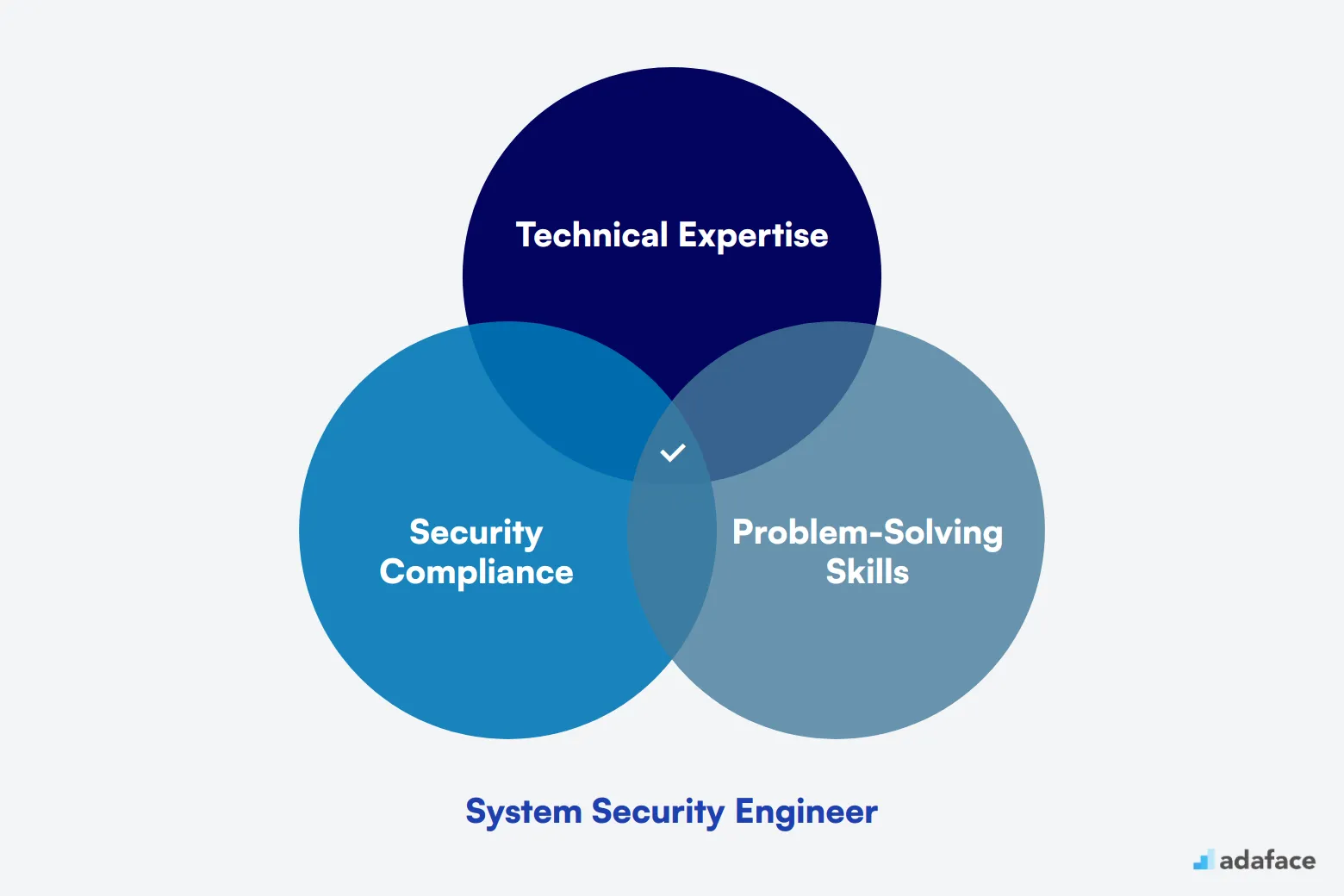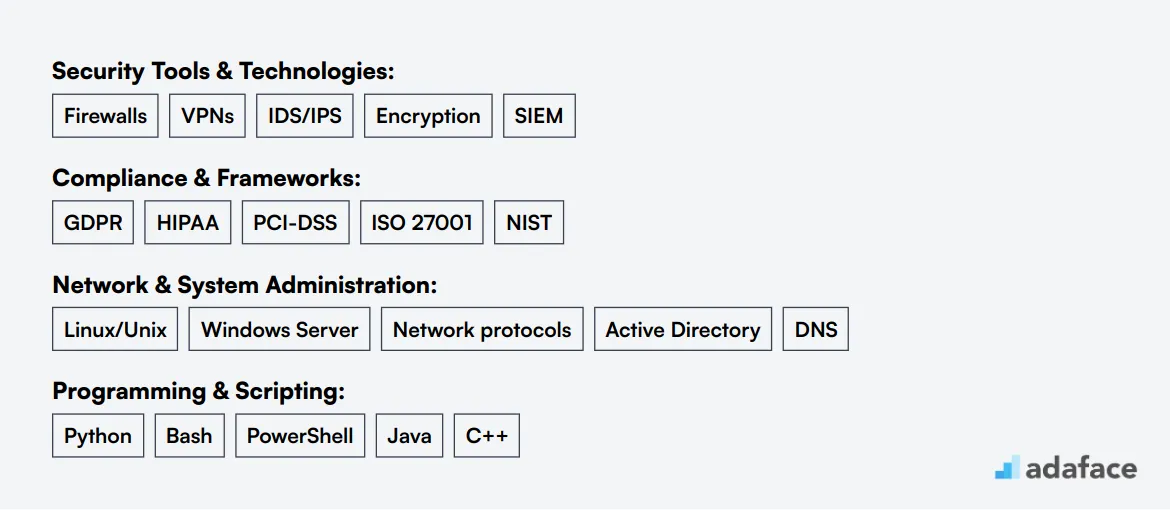In today's digital landscape, hiring a System Security Engineer is no longer a luxury but a necessity. As cyber threats become progressively sophisticated, companies are seeking experts who can safeguard their digital assets. However, many recruiters often miss the mark by focusing solely on credentials, rather than evaluating a candidate's practical skills and problem-solving abilities. It's crucial to understand how this role fits into the broader security architecture of your organization.
This article explores the role of a System Security Engineer, outlining the skills and qualifications required for success. We'll guide you through the hiring process, from identifying the right candidates on top platforms to conducting effective interviews. Check out our detailed guide on System Security Engineer interview questions to ensure you're asking the right questions.
Table of contents
Why hire a System Security Engineer?
To decide if you need a System Security Engineer, start by identifying your organization's security challenges. For example, you might be facing issues with data breaches, outdated security protocols, or compliance requirements.
Consider the following scenarios where a System Security Engineer can add value:
- Implementing and maintaining robust security infrastructure
- Developing security policies and procedures
- Conducting regular security assessments and penetration testing
If these tasks are becoming increasingly complex or time-consuming for your current team, it's time to consider hiring a full-time System Security Engineer. However, if you're unsure about the long-term need, working with a security consultant initially might be a good option.

What Does a System Security Engineer Do?
A System Security Engineer is responsible for protecting an organization's computer systems and networks from unauthorized access, breaches, and other cyber threats. They ensure the security of both hardware and software, working diligently to keep sensitive data safe.
The daily tasks of a System Security Engineer include:
- Analyzing security risks and implementing protective measures.
- Monitoring network traffic and responding to any suspicious activity.
- Conducting regular security audits and compliance checks.
- Collaborating with IT and other departments to ensure seamless security integration.
To learn more about the specific skills required for this role, you can explore this detailed guide.
System Security Engineer Hiring Process
The hiring process for a System Security Engineer role typically takes around 4-6 weeks. Here's a quick overview:
- Define the role requirements and create an accurate job description.
- Post the job opening on relevant job boards and begin accepting resumes.
- Shortlist candidates based on their resumes and cover letters.
- Conduct initial screening via technical assessments or coding tests.
- Schedule interviews (technical and behavioral) with the top candidates.
- Perform background checks and reference checks for the final candidate(s).
- Extend an offer to the most suitable candidate.
The process may vary slightly depending on the specific requirements of your organization, but this general flow covers the essential steps. Let's dive deeper into each stage to ensure a successful hire.
Skills and qualifications for a System Security Engineer
Defining the ideal candidate profile for a System Security Engineer can be tricky. The role requires a mix of technical expertise, security knowledge, and soft skills. It's important to distinguish between must-have requirements and nice-to-have preferences to attract the right talent.
Here are key skills and qualifications to consider when hiring a System Security Engineer:
Required skills and qualifications:
- Bachelor's degree in Computer Science, Information Technology, or related field
- 3+ years of experience in system security engineering
- Strong knowledge of security practices, tools, and protocols
- Experience with firewalls, VPNs, IDS/IPS, and encryption
- Familiarity with regulatory compliance frameworks (GDPR, HIPAA, PCI-DSS)
Preferred skills and qualifications:
- Master's degree in Cybersecurity or related field
- Certifications like CISSP, CISM, or CEH
- Experience with cloud security technologies
- Knowledge of network architecture and design
- Experience with penetration testing and vulnerability management
Remember, these are general guidelines. Tailor the requirements to fit your organization's specific needs and tech stack.
| Required skills and qualifications | Preferred skills and qualifications |
|---|---|
| Bachelor’s degree in Computer Science, Information Technology, or related field | Master’s degree in Cybersecurity or related field |
| Three or more years of experience in system security engineering or related position | Certifications like CISSP, CISM, or CEH |
| Strong knowledge of security practices, tools, and protocols | Experience with cloud security and related technologies |
| Experience with security technologies such as firewalls, VPNs, IDS/IPS, and encryption | Knowledge of network architecture and design |
| Familiarity with regulatory compliance frameworks such as GDPR, HIPAA, or PCI-DSS | Experience with penetration testing and vulnerability management |
Top 10 Platforms to Hire System Security Engineers
Now that we have a job description in hand, it’s time to explore various job listing sites to source candidates effectively. Utilizing the right platforms can help recruiters reach a wider audience and attract qualified System Security Engineers who fit the organizational needs.
LinkedIn Jobs
Ideal for posting full-time positions and reaching a wide network of professionals. Offers advanced search and filtering options for recruiters.

Dice
Specialized job board for tech roles. Excellent for targeting System Security Engineers with specific skills and certifications.

Indeed
Versatile platform for posting jobs of all types. Good for reaching a broad audience and aggregating candidates from multiple sources.

Start with popular options like LinkedIn Jobs for its vast professional network, or niche boards like Dice and InfoSec Jobs to target candidates with specific skills. For broader reach, platforms such as Indeed and Glassdoor can also provide valuable exposure.
Keywords to Look for in System Security Engineer Resumes
Resume screening is a critical first step in hiring System Security Engineers. It helps you quickly identify candidates with the right skills and experience before investing time in interviews.

When manually screening resumes, focus on key technical skills and certifications. Look for experience with security tools like firewalls, VPNs, and IDS/IPS. Also, check for knowledge of compliance frameworks such as GDPR, HIPAA, or PCI-DSS.
To streamline the process, consider using AI-powered screening tools. These can quickly scan resumes for relevant keywords and provide you with a shortlist of top candidates. Here's a sample prompt you can use with AI tools:
TASK: Screen resumes for System Security Engineer role
INPUT: Resumes
OUTPUT:
- Email id
- Name
- Matching keywords
- Score (out of 10 based on keywords matched)
- Recommendation
- Shortlist (Yes, No, or Maybe)
KEYWORDS:
- Security tools (firewalls, VPNs, IDS/IPS, encryption)
- Compliance frameworks (GDPR, HIPAA, PCI-DSS)
- Network administration (Linux/Unix, Windows Server)
- Programming (Python, Bash, PowerShell)
- Certifications (CISSP, CISM, CEH)
- Cloud security
- [Penetration testing](https://www.adaface.com/assessment-test/penetration-testing-test)
Recommended skills tests for System Security Engineers
Skills tests are a great way to evaluate System Security Engineer candidates objectively. They help you assess technical competencies and problem-solving abilities crucial for the role. Here are five key tests we recommend:
Cyber Security Test: This assessment evaluates a candidate's knowledge of network security, cryptography, and threat detection. It's important for System Security Engineers to have a strong foundation in these areas.
Ethical Hacking Test: An Ethical Hacking assessment gauges a candidate's ability to identify and exploit vulnerabilities. This skill is key for proactively securing systems and networks.
Linux Test: Many security systems run on Linux, making proficiency in this OS a must. This test evaluates command-line skills and system administration capabilities.
Cloud Computing Test: With the increasing adoption of cloud services, a Cloud Computing assessment helps verify a candidate's understanding of cloud security principles and best practices.
Programming Test: System Security Engineers often need to write scripts or analyze code. A programming test in languages like Python or Java can assess their coding abilities.
Case Study Assignments for Hiring System Security Engineers
Case study assignments can be effective for evaluating System Security Engineers, but they come with drawbacks. These assessments often lead to low completion rates and may cause qualified candidates to drop out due to their time-consuming nature. However, when used judiciously, they can provide valuable insights into a candidate's problem-solving skills and technical expertise.
Network Security Audit: This case study involves analyzing a fictional company's network infrastructure and identifying vulnerabilities. Candidates are asked to propose security measures and create an implementation plan. This assignment tests their ability to assess risks and develop comprehensive security strategies.
Incident Response Simulation: Candidates are presented with a scenario of a security breach and must outline their approach to containment, eradication, and recovery. This case study evaluates their crisis management skills and knowledge of incident response protocols.
Security Policy Development: In this assignment, candidates create a security policy for a hypothetical organization, addressing areas like access control, data protection, and compliance. It assesses their understanding of security best practices and ability to craft clear, enforceable policies.
Structuring Technical Interviews for System Security Engineers
After candidates pass the initial skills tests, it's time for technical interviews to assess their hard skills in depth. While skills tests are great for initial screening, technical interviews help identify the best candidates for the role. Let's look at some sample interview questions to evaluate System Security Engineer candidates effectively.
Here are 5-6 example interview questions for System Security Engineers:
- Explain the concept of defense in depth and how you'd implement it.
- How would you secure a cloud-based infrastructure?
- Describe a time when you identified and mitigated a security vulnerability.
- What's your approach to incident response and forensics?
- How do you stay updated with the latest security threats and countermeasures?
- Explain the differences between symmetric and asymmetric encryption.
These questions help assess the candidate's technical knowledge, problem-solving skills, and real-world experience in system security.
What are the ranks of System Security Engineers?
System Security Engineering can be confusing to navigate due to the various roles and responsibilities within the field. Different organizations may have different titles and expectations, but generally, the hierarchy includes several key positions that align with experience and expertise.
- Junior System Security Engineer: At the entry level, junior system security engineers assist with basic security tasks. Their duties often include monitoring security systems, responding to minor incidents, and supporting senior engineers in more complex projects.
- System Security Engineer: These mid-level professionals tackle more complex security challenges. They design and implement security measures, assess vulnerabilities, and ensure compliance with security policies. They often have a few years of experience and a solid grounding in various security technologies.
- Senior System Security Engineer: With extensive experience, senior engineers take on leadership roles, guiding teams and overseeing significant security projects. They are responsible for developing security strategies, training junior staff, and engaging with management to align security initiatives with business goals.
- Lead or Principal Security Engineer: This top-tier role involves setting the strategic direction for an organization's security efforts. Lead or principal engineers have deep expertise, often contributing to policy development, advanced threat modeling, and high-level planning. They play a critical role in shaping the security landscape of their organization.
For detailed information about the System Security Engineer job description, explore our comprehensive guide for a clearer understanding of the role and expectations.
Hire the Best System Security Engineers
Throughout this guide, we've explored the importance of hiring System Security Engineers, their key responsibilities, the necessary skills and qualifications, and how to structure interviews and assessments. By understanding these facets, recruiters and hiring managers can make informed decisions and find the right fit for their teams.
To wrap up, remember that a well-crafted job description and the right skills assessments can significantly improve your hiring process. Consider utilizing targeted skills tests like our cyber security assessment to identify top talent. This approach will help you accurately assess candidates' abilities and ensure you hire a system security engineer who meets your needs.
Cyber Security Assessment Test
FAQs
A System Security Engineer is responsible for designing, implementing, and maintaining security architecture to protect an organization's systems and data from cyber threats.
Look for skills such as network security, cryptography, penetration testing, and knowledge of security protocols. Experience with tools like firewalls and intrusion detection systems is also important.
You can find candidates on specialized job platforms such as LinkedIn, Indeed, and niche sites like CyberSecJobs. Consider also attending cybersecurity conferences and networking events.
Consider using skills assessments such as the Cyber Security Test from Adaface to objectively evaluate a candidate's technical abilities before moving to the interview stage.
Common questions include queries about past experiences with security breaches, how to handle a ransomware attack, and approaches to securing a cloud environment. For more, see our interview questions guide.
Typically, candidates have a background in computer science or information technology, with additional certifications in cybersecurity such as CISSP or CEH.
The hiring process often includes sourcing candidates, conducting initial screenings, skills assessments, technical interviews, and finally, evaluating cultural fit within the organization.

40 min skill tests.
No trick questions.
Accurate shortlisting.
We make it easy for you to find the best candidates in your pipeline with a 40 min skills test.
Try for freeRelated posts
Free resources



